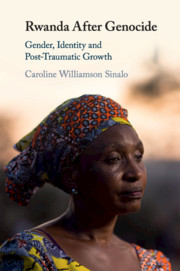Book contents
- Rwanda After Genocide
- Rwanda After Genocide
- Copyright page
- Contents
- Figures
- Tables
- Acknowledgements
- Preface
- Introduction
- 1 Defying Silence, Defying Theory
- 2 Post-Colonial Post-Traumatic Growth in Rwandan Men
- 3 Rwanda’s Women and Post-Traumatic Individualism
- 4 Communal Men and Agentic Women
- 5 What Is Really Unspeakable?
- Conclusion
- Bibliography
- Index
1 - Defying Silence, Defying Theory
Published online by Cambridge University Press: 08 October 2018
- Rwanda After Genocide
- Rwanda After Genocide
- Copyright page
- Contents
- Figures
- Tables
- Acknowledgements
- Preface
- Introduction
- 1 Defying Silence, Defying Theory
- 2 Post-Colonial Post-Traumatic Growth in Rwandan Men
- 3 Rwanda’s Women and Post-Traumatic Individualism
- 4 Communal Men and Agentic Women
- 5 What Is Really Unspeakable?
- Conclusion
- Bibliography
- Index
Summary
- Type
- Chapter
- Information
- Rwanda After GenocideGender, Identity and Post-Traumatic Growth, pp. 21 - 52Publisher: Cambridge University PressPrint publication year: 2018



